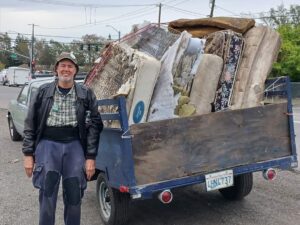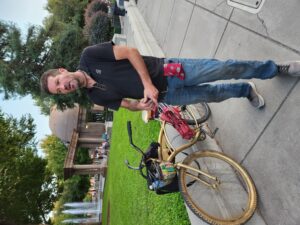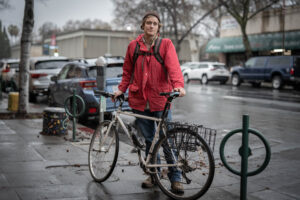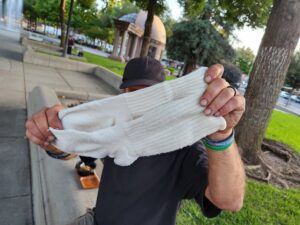Part II of a two-part series. Read part I on surviving extreme conditions here.
Beyond the gate that secures southeast Chico’s “Genesis,” the little grey sleeping cabins are in orderly lines. There are suggestions that this is home, for the moment, to occupants who have planted a cactus garden, or leaned a bicycle against their pallet shelter, or left a walker by the door.

The 177 pallet shelters – the village named Genesis — provide autonomy and greater security than the occupants, who were previously unsheltered, probably had before they moved in. They’re a key piece in what success the City has had in responding to homelessness, a product of the 2022 settlement in the Warren v. Chico lawsuit.
Since that settlement, signed almost two years ago, the City has eliminated the large, sprawling encampments in public parks and along the creeks. But Genesis, other housing options and the City-sanctioned “alternate site” campground – also opened in response to the lawsuit – have not resolved the shelter crisis.
That crisis continues, in lockstep with the ongoing debate over the City’s responsibility as it faces homelessness and housing shortages. Smaller encampments continue to pop up, sometimes yards away from where an eviction recently took place.
Five years after the Camp Fire destroyed some 11,000 Paradise-area homes, driving up housing costs and adding to the number of unhoused, Butte County still wrestles with homelessness. The number of homeless people in the county increased by 7 percent in 2023 over the previous year, according to the January survey conducted by the Butte County Continuum of Care.
The largest share of that population – 925 – live in Chico. Here’s the good news: The percentage that reported that they were unsheltered on a given night dropped from 44% to 40% of the total.
“We have more people in shelter now than we’ve ever had,” said Charles Withuhn, founder of the North State Shelter Team that is one of the organizations belonging to the Continuum of Care consortium. “This is great news. But there are still other people [for whom existing] options don’t work.”

The City also acknowledges that it still faces problems related to homelessness, but places the blame not on the menu of options, but on a court settlement that has its enforcement operations constrained.
“Chico settled its homelessness litigation in January 2022, yet problems persist,” the City states in a legal brief filed Nov. 3 with the U.S. Supreme Court in support of an effort to revisit court rulings on homelessness.
(City Manager Mark Sorensen didn’t respond to a request for comment.)
City Councilmember Addison Winslow, the lone progressive on the panel, said City staff had estimated the cost of filing the brief, which he opposed, at $50,000.
Withuhn points to the alarming number of people who die on the streets each year as evidence that the shelter crisis is unresolved. Chico Police Department has issued 15 “Death in Public” press releases so far this year, two more since part I of this story posted on Oct. 2.
City officials point to unoccupied pallet shelters and open beds at the two congregate (dorm-style) shelters to show that sheltering space is available, which enables evictions, or “enforcements” under the settlement agreement. Evictions have come in a steady stream this past year, and the City was evicting campers from sites in southeast Chico this week, including on a portion of bike path that runs from Skyway to Teichert Ponds.
On Nov. 8, for example, there were three open beds in the women’s dorm at the Jesus Center, 51 open beds in the men’s dorm at the Torres Community Shelter, and 17 available pallet shelters.
The Genesis vacancies rankle people like Nathan Beakley, who was evicted in the sweep of Depot Park last summer. Beakley was referred to the Torres Shelter at the time, but when he was interviewed by ChicoSol in late September, had declined to go and wanted a pallet shelter with a locking door and privacy. With no referral, the pallets were inaccessible.

“The pallet shelters work,” Beakley said during an interview in downtown Chico. “They need 200 more.”
The day following his interview, he called ChicoSol, and in a desperate voice said the pallets were a “wasted resource.”
Beakley balked at the curfew and other rules imposed by the Torres Shelter and worried that his belongings would be unsafe in its dormitory.
Warren v. Chico shapes enforcement, sheltering
When eight unhoused people filed the Warren v. Chico lawsuit in April 2021, their argument was in part based on the landmark Martin v. City of Boise ruling. In that case, plaintiffs argued that to prosecute people for their use of public space was a violation of the Eighth Amendment – prohibiting cruel and unusual punishment – if there were no alternative shelter spaces.
Under the settlement, the City was able to establish an assessment procedure, reserving pallet shelters for unhoused campers who have been referred there. The settlement doesn’t require people be given options even when they may exist.

Amber Abney-Bass, executive director of the Jesus Center that runs Genesis on contract for the City, explained that an unhoused camper’s stated preference is not a “determining factor” in placement.
“People don’t have the opportunity to choose,” said Abney-Bass. “Our goal is not to have empty beds. We’re triaging here. This is the process that was blessed by the plaintiffs, blessed by the City of Chico, and ultimately by the judge.”
As a “small example” of how a decision might be made, Abney-Bass said a couple might be given higher priority for a pallet shelter than a single person if it seems the single individual could go to Torres’ gender-segregated dorms. “The settlement protects people who are partners,” she said.
To request assessment, unsheltered people are asked to call the City’s Shelter Interest Phone Line. But the website warns that because of a “high volume of calls” it may take several weeks to get a response.
The settlement agreement requires that the Outreach and Engagement team conducts assessments of unhoused people who request them or undergo eviction. The team must attempt to contact 10 people each week — unless evictions are underway. In that case, the team only contacts five people who have called in.
At the end of September, Abney-Bass said her staff was more than halfway through the 1,660 calls that had been logged to the line.
From Genesis to a new home
Abney-Bass is proud of one measure of the program’s success: In the eight months after the pallets opened last year, 14 residents of Genesis moved to a rental unit, re-united with family, or found other transitional or permanent housing.
That number may sound small, but after homelessness, people often need months to get back on their feet.
“They’re psychologically accustomed to living in survival mode,” she said. “They need time to move out of survival mode, time to do that and breath and believe. We should celebrate every single one of those [14] people.”

Robert Wetzel wants a chance at one of the City’s pallet shelters. Like Beakley, he said he was referred to Torres, where he’s already been numerous times. He doesn’t want to return, so he’s living at the alternate site campground in north Chico. Campers there are routinely subjected to passersby shouting and shooting at them, as well as other offenses, he said. (See sidebar.)
Enforcement or another option?
City leaders have continued to focus on enforcement of anti-camping ordinances as their tool of choice, keeping parks and waterways free of encampments.
Now, when a new encampment pops up, “we’re instantly responding to it” with warning notices, Mayor Andrew Coolidge told Action News last month. Asked about people who continue to refuse shelter, Coolidge said this: “You’re gonna see prosecutions come from the City of Chico.”
(The mayor didn’t respond to a request for comment for this story. See sidebar here.)
To underline its concern, the City recently filed an amicus brief with the U.S. Supreme Court, supporting an effort to get judicial review of the lower court rulings on homelessness, including the 2019 Martin v. Boise case.
“Chico’s homeless population has become significantly more defiant with city personnel and the general public as the immunity afforded by [Martin v. Boise ruling] strips away the deterrence that anti-camping laws provide,” it states in the brief.
Withuhn, who three years ago founded the North State Shelter Team that now runs a mobile shower unit, says the fact of “open beds” at a congregate shelter may be “meaningless” to people who have been there and had “really bad experiences,” or who can’t adapt to that kind of environment.
Withuhn believes that a “significant number” of unhoused community members need some kind of managed, outdoor living set-up. He’s explored programs that offer case management and successfully move people into housing. He’s now advocating a “safe spot community” that could be placed on a church parking lot and include some tiny homes that have already been built.
“The point is,” Withuhn said, “people are going to die outside unless we provide more shelter right away.”

Councilmember Winslow, a bicyclist, noted that encampments don’t belong on City bike paths or in other public and private spaces. But the effort to uproot them without offering an option campers won’t resist is a “lose-lose situation.”
“We’re chasing them around from one spot to another and it’s not good for anybody,” Winslow said. Forcing people to go to dorm-like shelters when they have reasons for not going — reasons that might be “more legitimate or less legitimate” — isn’t working, he added. And it places people who won’t go to a congregate shelter and have no other choice “outside the law.”
Winslow believes the City should “take responsibility” for the lack of affordable housing and offer -– with the help of volunteers and nonprofits — options that are still needed.
“It’s not a perfect solution, but we can make something decent enough until we have enough housing for everybody,” he said.

Jason M., interviewed at City Plaza in late September, said he was evicted from a pallet shelter earlier this year for having too many belongings piled up inside that were deemed a fire hazard. He’s since pared down and wants a second chance.
Where does he live now?
“Everywhere and nowhere,” he said. “You have to keep jumping, you have to hide, keep a low profile. I have to be careful about going back to the same spot; I’ve been warned so many times. The problem is the economy; it’s tough to find a job.”
Leslie Layton is editor of ChicoSol.
Editor’s note: Jason M. passed away shortly after this series was posted; his body was found Nov. 20 at Fifth and Main streets.

Yes these pieces of fact and opinions’ on homelessnesss in Chico are exactly just that. There shouldn’t be 17 pallets available, 50 plus openings at the Torres Shelter (also never mentioning the other available programs/ opportunities that can take people off the street). All the while to be stiffened with and by stipulations that do nothing to change the overall fact that good people given the same chance for betterment will do that…. MAKE IT BETTER. We need better leadership , better accesstment teams , better business owners , better policies, better judgement of character, better accountability , and then straight numbers so the bad can’t just count on bad to prevail. Also interviewing the same homeless and none homeless people over is good for popularity but not for humanity and township , if that’s what you are really after ? I know I am and I’ve been waiting since June 17th,2023 just to be given 1 chance 1 opportunity 1 love, to have a way , so I can better myself and better understand who I can trust…. To be continued
Thank you for keeping this issue in the forefront. There are more effective programs in other cities that would be good to give a chance in Chico.
I am an unhoused resident of butte county. I have been unhoused for over 20 years added up in total. I have good credit, no debt, criminal record, and a clean license, as well. I do have a job. I do pay taxes. I do also live at the genesis shelter since the first week it was puked out of the states’ leaders and judicial system. I can, and will be the loudest voice on everything Warren vs. Wade if, given the right press. With intentions to publicize the current daily issues we are facing since the ruling by the judge. The problems stem from a couple major undiscussed barriers that the Warren vs. Wade case has simply overshadowed. Bobby Warren, the original plaintiff on the case is a friend of mine. I have been a street ambassador and saint to everyone I have come across in need on my journeys and have saved lives for decades on the ground level enough that the unhoused community here will back me up as their standing voice.
Here I would like to share that I am a school shooting survivor in 1989 and have watched carnage unravel right before my eyes at age 6. Since then, I have been doing what I have been doing and living. Please refer to the beginning of this article where I state my good-standing with the city and the public. I have met all kinds of walks. Shook hands with the devil daily. But, the biggest issue that is overshadowed is the governments bureaucracy is very complex for a majority of the unhoused population. This stands true on the cities side as well. The city has laws and simply put, the FORCE of policing and evicting is against the 8th ammendment of cruel and unusual punishment. The police have on a city level mentality and are “raised” with corrupt language during whatever training they go through. If we’re training police to use derogatory terms like homeless and that’s the kind of attitude the city takes on. Then on a county crisis, within a governed state by the United States of America in a city funded by its citizens are being grouped as the “Homeless population” when me and my friend Bobby Warren are completely different people in terms of being in a group. We need individual funding from the county and government level instead of this fruitless seed that everyone knows just evaporates when time runs up. The county’s big enough to house every individual in the country. Not saying that’s a solution, but this type of overshadowing is why nothing will have been done except a couple few permanent housed people that were already being federally or statefunded on ssi or ssdi and just didn’t know where to put their free money and keep their drugs. So the number will grow. And grow. Unless there is some kind of pilot program that shares financially responsibility to get people back on their feet like me. Theirs no good reason why I am still unhoused and in my condition except money. I pay taxes. So the city can give that money to my co-habitants freely. Does that sound right? Because when all is said and done .. I get to still be unhoused and paying their rent.
Kristopher Vetter
They call me Stockton.